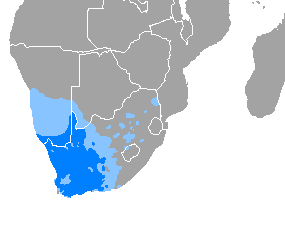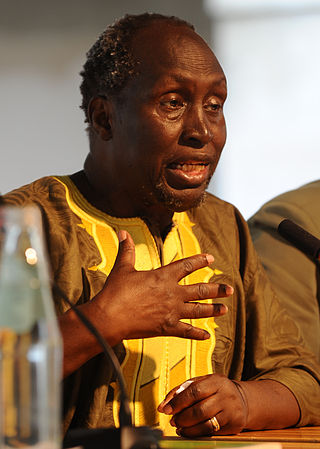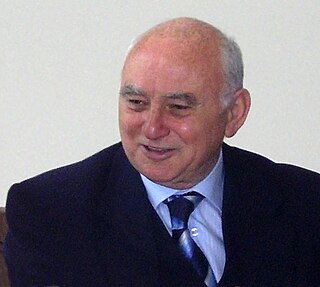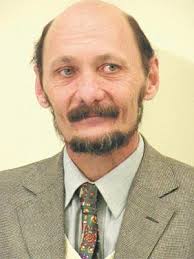Related Research Articles

Afrikaans is a West Germanic language, spoken in South Africa, Namibia and Botswana, Zambia and Zimbabwe. It evolved from the Dutch vernacular of South Holland spoken by the predominantly Dutch settlers and enslaved population of the Dutch Cape Colony, where it gradually began to develop distinguishing characteristics in the 17th and 18th centuries.

Ngũgĩ wa Thiong'o is a Kenyan author and academic, who has been described as "East Africa's leading novelist". He began writing in English, switching to write primarily in Gikuyu. His work includes novels, plays, short stories, and essays, ranging from literary and social criticism to children's literature. He is the founder and editor of the Gikuyu-language journal Mũtĩiri. His short story The Upright Revolution: Or Why Humans Walk Upright has been translated into 100 languages.

Charles Richard Johnson is an American scholar and the author of novels, short stories, screen-and-teleplays, and essays, most often with a philosophical orientation. Johnson has directly addressed the issues of black life in America in novels such as Dreamer and Middle Passage. Johnson was born in 1948 in Evanston, Illinois, and spent most of his career at the University of Washington in Seattle.

Driss Chraïbi was a Moroccan author whose novels deal with colonialism, culture clashes, generational conflict and the treatment of women and are often perceived as semi-autobiographical.
William Joseph Kennedy is an American writer and journalist who won the 1984 Pulitzer Prize for his 1983 novel Ironweed.

David L. Smith is a noted historian at Selwyn College, Cambridge. He specializes in Early Modern British history, particularly political, constitutional, legal and religious history within the Stuart period. He is the author or co-author of eight books, and the editor or co-editor of seven others, and he has also published more than seventy essays and articles.

The University of the Western Cape is a public research university in Bellville, near Cape Town, South Africa. The university was established in 1959 by the South African apartheid government as a university for Coloured people only. Other universities in Cape Town are the University of Cape Town, Cape Peninsula University of Technology, and Stellenbosch University. The establishing of UWC was a direct effect of the Apartheid-era Extension of University Education Act, 1959. This law accomplished the segregation of higher education in South Africa. Coloured students were only allowed at a few non-white universities. In this period, other "ethnical" universities, such as the University of Zululand and the University of the North, were founded as well. Since well before the end of apartheid in South Africa in 1994, it has been an integrated and multiracial institution.

Paterson Davis Joseph is a British actor and author. He was announced as Chancellor of Oxford Brookes University in October 2022.
David Dabydeen FRSL is a Guyanese-born broadcaster, novelist, poet and academic. He was formerly Guyana's Ambassador to UNESCO from 1997 to 2010, and was the youngest Member of the UNESCO Executive Board (1993–1997), elected by the General Council of all Member States of UNESCO. He was appointed Guyana's Ambassador Plenipotentiary and Extraordinaire to China, from 2010 to 2015. He is one of the longest serving diplomats in the history of Guyana, most of his work done in a voluntary unpaid capacity. He is a cousin of Guyana-born Canadian writer Cyril Dabydeen.

Brian Brendon Talbot Cleeve was a writer, whose published works include twenty-one novels and over a hundred short stories. He was also an award-winning broadcaster on RTÉ television. Son of an Irish father and English mother, he was born and raised in England. He lived in South Africa during the early years of National Party rule and was expelled from the country because of his opposition to apartheid. In his early thirties he moved to Ireland where he lived for the remainder of his life. In late middle age he underwent a profound spiritual experience, which led him to embrace mysticism. He developed a model for the spiritual life based on the principle of obedience to the will of God.
Jan Rynveld Carew was a Guyana-born novelist, playwright, poet and educator, who lived at various times in The Netherlands, Mexico, the UK, France, Spain, Ghana, Jamaica, Canada and the United States.

Zephania Kameeta is a Namibian religious and political leader. Since March 2015, he has been the Namibian Minister of Poverty Eradication and Social Welfare.

Dr. Clark Gilbert Reynolds, B.A., M.A. (History), Ph.D. was a historian of naval warfare, with a particular interest in the development of U.S. naval aviation. In addition, he made contributions to the fields of world history, strategic history, and the history of maritime civilizations.

Ferenc Glatz is a Hungarian historian and academician. He has served three terms as the president of the Hungarian Academy of Sciences.
Clifford Nelson Fyle was a Sierra Leonean academic and author, known for writing the lyrics to the Sierra Leone National Anthem.

André du Pisani is a Namibian political scientist, author of several books, articles and journals, he has written several conference papers for SADC, the Namibian government and several ministries, he is a professor at the University of Namibia Department of Political Science. Du Pisani has been a professor at the university since 1998.

Eric Otto Koch was a German-born Canadian author, broadcaster and academic.

Marion Patrick Jones was a Trinidadian novelist, whose training was in the fields of library science and social anthropology. She is also known by the names Marion Glean and Marion O'Callaghan. Living in Britain during the 1960s, she was also an activist within the black community. She was the author of two notable novels – Pan Beat, first published in 1973, and J'Ouvert Morning (1976) – and also wrote non-fiction.
Joseph Kalimbwe is a Zambian politician, author and activist. Previously, he was president of the African Union youth simulation in 2014 and president of the student representative council of the University of Namibia in 2017. He has written for the Namibian Sun, and has published three books including Persecuted in Search of Change in 2017, The Pain of An Empty Stomach in 2015 and Teenage-Hood & the Impact of the Western World in 2014.

Ndeutala Angolo, also known as NdeutalaSelma Hishongwa and Ndeutala Angolo Amutenya, is a Namibian writer and political activist.
References
- ↑ Tonchi, Victor L; Lindeke, William A; Grotpeter, John J (2012). Historical Dictionary of Namibia. Historical Dictionaries of Africa, African historical dictionaries (2 ed.). Scarecrow Press. p. 87. ISBN 9780810879904.
- ↑ Making a Literature: The Case of Namibia Author(s): Michael Chapman Source: English in Africa, Vol. 22, No. 2 (Oct. 1995), pp. 19–28 Published by: Institute for the Study of English in Africa, Rhodes University
- ↑ Joseph Diescho Archived 11 June 2011 at the Wayback Machine Namibia Institute for Democracy
- "Joseph Diescho". Contemporary Authors, Gale, 2002.
- Diescho, Joseph, with Celeste Wallin. Born of the Sun: a Namibian Novel. New York City: Friendship Press, 1988.
- Diescho, Joseph. Troubled Waters: A Novel. 1993. Windhoek, Namibia: Gamsberg Macmillan Publishers.